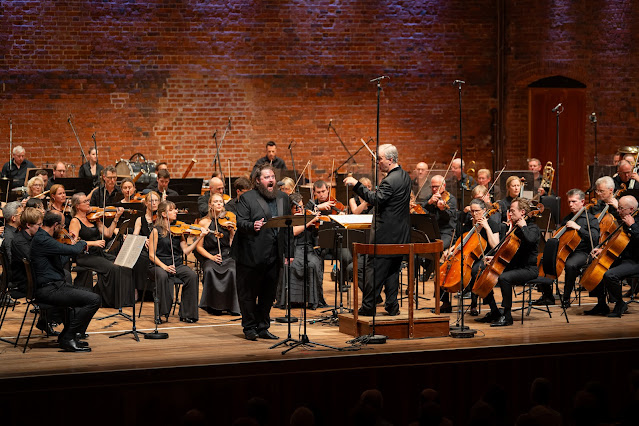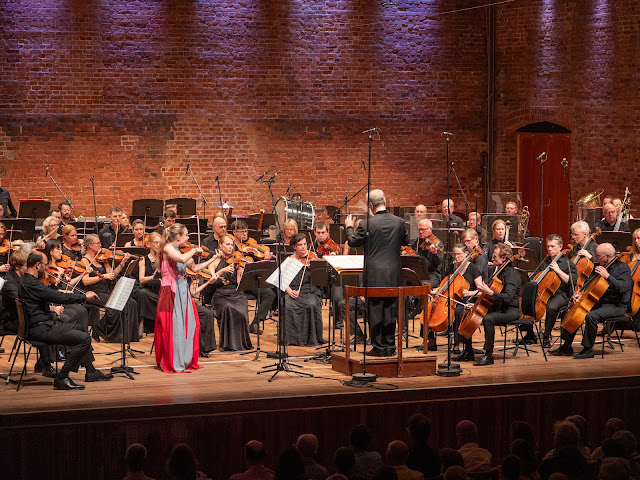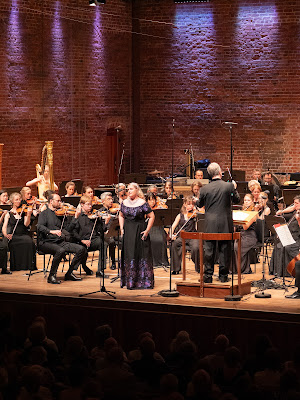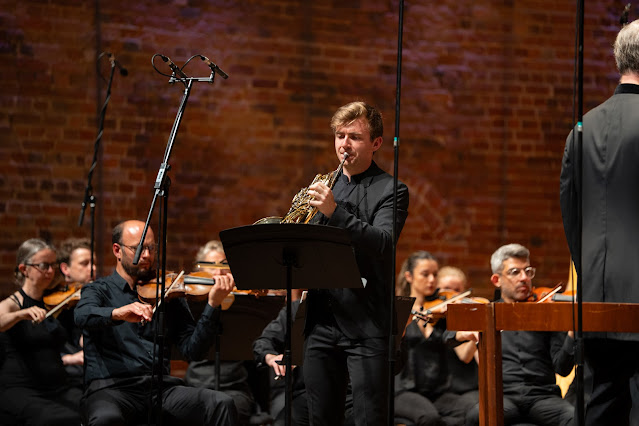 |
| Britten: Our Hunting Fathers – Allan Clayton, BBC Symphony Orchestra, Sakari Oramo – Snape Maltings, Aldeburgh Festival (Photo: Britten Pears Arts) |
Daniel Kidane: Awake, Helen Grime: Violin Concerto, Strauss: Tod und Verklärung, Vier letzel Lieder; Anu Komsi, Leila Josefowicz, BBC Symphony Orchestra, cond. Sakari Oramo; Snape Maltings Concert Hall.
Helen Grime: Night Songs, Britten: Our Hunting Fathers, Brian Elias: Horn Concerto, Sibelius: Symphony No.5 in E flat; Allan Clayton, Ben Goldscheider, BBC Symphony Orchestra, cond. Sakari Oramo; Snape Maltings Concert Hall
Reviewed by Tony Cooper, 21 & 22 June 2025
The performance by Allan Clayton of Britten’s song-cycle, Our Hunting Fathers, with the BBC Symphony Orchestra proved a highlight of my Aldeburgh Festival weekend
When the BBC Symphony Orchestra turns up on the Suffolk coast, it’s a grand event all round. Blooming marvellous, I say! In their first concert for this year’s Aldeburgh Festival (Saturday 21 June), opening with a brilliant performance of Daniel Kidane’s Awake, a 12-minute work written by Kidane in his early thirties when ‘raring to go’ making (and marking) a breakthrough in his blossoming career.
Kidane writes to my liking and Awake (which received its première at the Last Night of the Proms in 2019) offers the listener a host of soaring melodies punctuated by erratic rhythmic patterns and extremely bold harmonies thereby reflecting the composer’s interest in jazz and all the associated ‘spin-offs’ that this musical genre inspires.
There’s no ‘let-up’ for members of the orchestra as from the first to the last bar of this riveting and exciting work of exacting proportions they’re playing at full speed with Kidane’s bright and colourful score constructed round a series of interconnective sections thereby creating continuity and flow.
A brilliant curtain-raiser to the concert the visual and musical aspect of it was highlighted by a member of the percussion department who (proudly standing) circled above his head a ‘wind whistler’ (‘whirly tube’) adding so much to the overall soundscape of an interesting and challenging piece which the audience lapped up.
 |
| Helen Grime: Violin Concerto – Leila Josefowicz, BBC Symphony Orchestra, Sakari Oramo – Snape Maltings, Aldeburgh Festival (Photo: Britten Pears Arts) |
And if there was no ‘let-up’ for Kidane’s Awake, the same goes for Helen Grime’s Violin Concerto, premièred by Malin Broman and the Swedish Radio Symphony Orchestra in 2016 and now receiving its UK première by Leila Josefowicz. She’s ‘on the go’ from the start playing vigorously right to the very end. An outstanding musician, she delivered an amazing performance.
A strongly-textured and detailed work, it falls into three main sections featuring extensive dreamlike interlinking passages connecting them. Composed in one continuous movement, a style I greatly favour, it keeps one’s mind truly focused and, of course, bypasses the usual pauses between movements.
‘Lovingly’ violent, aggressive and entertaining all wrapped up in one fantastic 22-minute work, Josefowicz, superbly confident and relaxed in her own inimitable performance style, faced a host of difficult runs and intricate chord patterns which she played so effortlessly demonstrating the command and exceptional technical skill she has of her chosen instrument.
There have been so many famed and stunning performers take to the stage of the Snape Maltings Concert Hall – now it numbers Leila Josefowicz who delivered a performance of great magnitude and strength that was more than well received by a discerning (and packed) house that knows the drill.
Interestingly, parental advice guided Josefowicz to her chosen career. Her father encouraged her to take up the violin. And like so many virtuoso violinists, she was a child prodigy receiving her first violin lessons at the age of three and a half using the Suzuki method. She later studied at the Curtis Institute in Philadelphia. At the age of 16, she was at Carnegie Hall playing Tchaikovsky’s Violin Concerto with the Academy of St Martin in the Fields under Sir Neville Marriner.
Constantly integrating new music into her programmes, Josefowicz enjoys performing premières of new works. For instance, her interpretation of John Adams’ Violin Concerto with the BBC Symphony Orchestra in 2002 turned out to be a blazing success while her recording of Esa-Pekka Salonen’s Violin Concerto with the Finnish Radio Symphony Orchestra under the composer’s baton, nominated for a Grammy Award, received many plaudits.
The second half of the programme was devoted to Richard Strauss: Death and Transfiguration (Tod und Verklärung) and Four Last Songs (Vier letzte Liede) both works scored for a large orchestra and the BBC Symphony on this occasion was, indeed, very large, taking up the length and breadth of Snape Maltings Concert Hall’s vast stage. I’m glad my seat wasn’t in the front rows!
Depicting the final thoughts of an ailing artist nearing the ending of his life, Death and Transfiguration was completed in 1889 at the beginning of the composer’s career when he was 24 years old while Four Last Songs was completed in 1948, a year before his death at 84. The title ‘Four Last Songs’ was provided posthumously by Strauss’ good friend, Ernst Roth, who published them as a single unit in 1950 after the composer’s death in September 1949.
 |
| Strauss: Four Last Songs – Anu Komsi, BBC Symphony Orchestra, Sakari Oramo Snape Maltings, Aldeburgh Festival (Photo: Britten Pears Arts) |
The songs, of course, are the composer’s final completed works and they’re suffused with a sense of calm, acceptance and completeness. Apart from ‘Frühling’ they all deal with the subject of mortality and all the settings are scored for a soprano while the songs have prominent horn parts. Interestingly, Strauss’ wife, Pauline de Ahna, was a soprano and his father, Franz Joseph, a horn player – principal horn, in fact, at the Munich Court Opera.
Towards the end of ‘Im Abendrot’ following the soprano’s intonation of ‘Ist dies etwa der Tod?’ (‘Is this, perhaps, death?’), Strauss quotes another one of his tone poems, Death and Transfiguration, written 60 years earlier, quoting the seven-note phrase (known as the ‘transfiguration theme’) seen as being the fulfilment of the soul through death.
One of the last wishes that Strauss made was to the fact that Kirsten Flagstad should be the singer. ‘I should like to make it possible,’ he said in a letter to her, ‘that the songs should be at your disposal for a world première in the course of a concert with a first-class conductor and orchestra.’ That ‘wish’ came true as Four Last Songs received its world première at the Royal Albert Hall on 22 May 1950 featuring Flagstad and the Philharmonia Orchestra conducted by Wilhelm Furtwängler.
On this occasion, the Finnish-born soprano, Ann Komsi, transported one to a world of peace and tranquillity underlying the spiritually-inspired writings of Hermann Hesse and Joseph von Eichendorff displaying a delicate and well-controlled vocal line but at times I felt that her voice was seemingly far too ‘light’ to fill the expansive realms that Strauss’ richly-textured score deserves and calls for.
However, Maestro Oramo took firm control of his charges, quickly getting to grips with the acoustics of the hall, on a very hot and humid night. As the work progresses towards its conclusion Strauss’ rather grand orchestral writing comes into its own depicting the artist’s life appearing briefly before him before the transfiguration from life to death – the point when the soul departs the body to an eternal life.
The BBC Symphony Orchestra’s second concert in this year’s Aldeburgh Festival (the 76th edition) had at its heart the fifth symphony of Sibelius, commissioned in 1915 by the government of Finland to commemorate the composer’s 50th birthday. The work’s powerful, dramatic and emotional to the core building up to a thrilling and exciting climax.
Turning out to be a popular, powerful and evocative three-movement work, Sibelius Fifth offers a sense of renewal and optimism as well as moments of anxiety and darkness. The second movement, in particular, is so pleasing and refreshing featuring a set of variations on a simple cyclic theme while the final movement conjures up a thrillingly-cacophonous ‘sonic blur’ thus creating an ambiguous unified soundscape.
As an aside, Britten initially found Sibelius’ music unsympathetic but later came to appreciate and admire it. In his youth, he was drawn to the works of Schoenberg, Berg and Webern as well as Stravinsky finding Sibelius’ style less appealing. However, after encountering Sibelius’ Sixth Symphony, Britten began exploring his music with greater interest and found it more interesting than he first thought. In fact, he acquired many of Sibelius’ scores thereby acknowledging this Finnish-born composer as a key figure in music.
 |
| Brian Elias: Horn Concerto – Ben Goldscheider, BBC Symphony Orchestra, Sakari Oramo – Snape Maltings, Aldeburgh Festival (Photo: Britten Pears Arts) |
The concert, however, opened with a short work by Helen Grime entitled Night Songs written in 2012 in celebration of the 60th birthday of Oliver Knussen. A lovely, tender and satisfying piece, it found the members of the BBC Symphony Orchestra playing so well under the baton of Maestro Oramo while in Brian Elias’ Horn Concerto, written in 2023, comprising three main sections with a coda played without a break, received its world première by Ben Goldscheider, the dedicatee of the work, who delivered a technically-assured and, indeed, relaxed performance.
Completing the programme fell to Britten’s song-cycle, Our Hunting Fathers, set to a text by WH Auden, premièred at the 34th Norfolk & Norwich Triennial Musical Festival in St Andrew’s Hall, Norwich (the ‘home’ of the Triennial since its founding in 1824) on 25th September 1936 featuring the Swiss-born soprano Sophie Wyss and the London Philharmonic Orchestra. The performance, conducted by the composer, went without mishap but left ‘most of the audience’, according to Britten, ‘very interested if not slightly bewildered’.
Widely considered a key work in Britten’s early output, Our Hunting Fathers explores themes of humanity’s relationship with nature and each other often through a lens of pacifism and social commentary. Both Britten and Auden were, of course, strong-minded pacifists. The piece is known for its challenging vocal writing, complex orchestration and use of musical satire to convey its message and Allan Clayton, a featured artist in this year’s festival, did the work justice, by delivering a brilliant, articulate and utterly rewarding performance.
With such a busy weekend in such salubrious company as the BBC Symphony Orchestra – an orchestra whom I greatly favour – I took in a concert by the Dunedin Consort, led by Matthew Truscott, at Blythburgh Church – once again I found myself in the company of Allan Clayton. This time round he was offering a sprightly rendering of a new work by Tom Coult entitled Black Shuck Lament based on the legend of Bungay’s Black Dog, a ghostly ‘beast’ going by the name of ‘Black Shuck’ who roamed the coastline and countryside of Suffolk terrifying the neighbourhood – or so the tale goes!
The programme also offered a couple of popular pieces by JS Bach – Brandenburg No.5 and Orchestral Suite No.2 in B minor – as well as a ten-minute work by Caroline Shaw entitled Punctum. A mystical, dreamy and atmospheric piece scored for string quartet, Shaw’s inspiration for writing it came from Roland Barthes’ description of the ‘unexpected’ in photographs referencing his description of the elusive ‘Winter Garden’ picture published in his 1980 book, Camera Lucida.
And still I found time to take in a wonderful and fitting tribute to the German master of lieder, Dietrich Fischer-Dieskau, with a full and exacting programme of songs ranging from Schubert to Wolf not forgetting Britten, Brahms and Barber – and even Tchaikovsky.
Held in the intimacy of the Britten Studio, baritone Benjamin Appl (born in Regensburg, Germany, and a member of the Regensburger Domspatzen, the world-famous boys’ choir of the Regensburg Cathedral) accompanied by the pianist James Baillie, offered a welcoming and pleasant programme appropriately opening (and ending) with Schubert interspersed by readings (amusing, sad, indifferent and melancholic) from former Coronation Street actor, Jamie Newall, tracing and punctuating the singer’s life-story in a poignant, positive and sympathetic way.
For instance, we discovered that Appl became an extremely close friend of Fischer-Dieskau after he attended one of his master classes at the Schubertiade in Schwarzenberg in 2009. He studied with him, too. And just a few weeks before his death in May 2012, Appl was once more by his side – but for the very last time.
The blog is free, but I’d be delighted if you were to show your appreciation by buying me a coffee.
Elsewhere on this blog
- Brilliant reinvention & razor sharp take-down: Scottish Opera’s double-bill pairs Gilbert & Sullivan with Toby Hession’s brand new comedy – opera review
- A trio of concerts at this year’s Aldeburgh Festival highlights the diversity of music to be found on the Suffolk coast – concert review
- That was quite a party! Paul Curran’s production of Die Fledermaus at The Grange Festival is a terrific evening in the theatre – opera review
- Modern resonances & musical style: Richard Farnes conducts Verdi’s La traviata at The Grange Festival with Samantha Clarke & Nico Darmanin – opera review
- Maiden, Mother & Crone: Rowan Hellier on her interdisciplinary project integrating music & movement exploring Baba Yaga – interview
- The Merry Widow meets the Godfather: Scottish Opera brings John Savournin’s production of Lehár’s operetta to Opera Holland Park – review
- Enjoyment, exploration & sheer virtuosic fun: Sisters from Karine Deshayes & Delphine Haidan – record review
- The earth moves: Antoine Brumel’s 12-part Earthquake Mass & Tallis’ 40-part motet from Peter Phillips & The Tallis Scholars – concert review
- Lieder, songs and sonnets: David Butt Philip in Vaughan Williams, Alma Mahler, Wagner & Britten at Wigmore Hall – concert review
- A Visit to Friends: The opening work of the Aldeburgh Festival’s 76th edition fell to Colin Matthews’ first foray into opera – opera review
- Home









